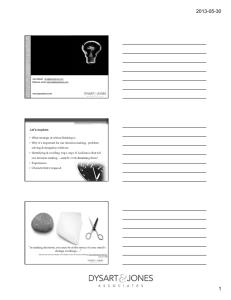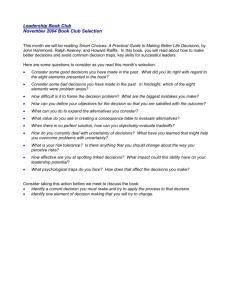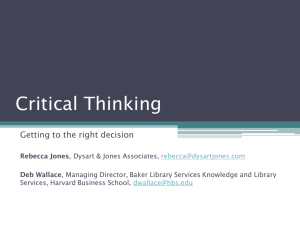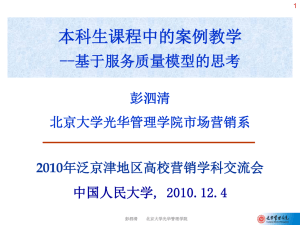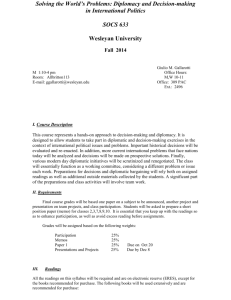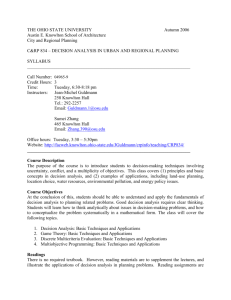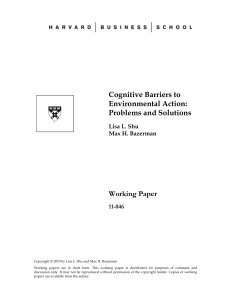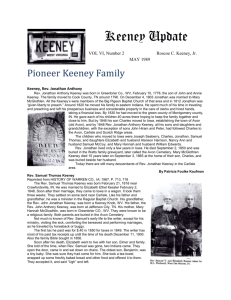slide - SLA-The ASian Chapter
advertisement
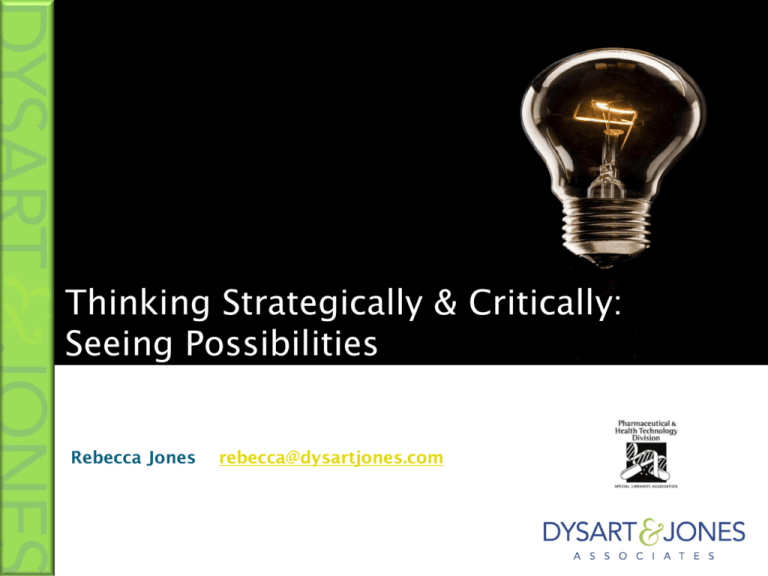
Thinking Strategically & Critically: Seeing Possibilities Rebecca Jones rebecca@dysartjones.com Strategic plan or dentist visit? http://blog.markarnold.org/2011/03/is-your-strategic-plan-like-going-to-the-dentist.html ..anytime someone says EXPECT THE UNEXPECTED I like to punch them in the face and say, not as easy as it sounds is it??! @LordStewie Focus for today Viewing situations & solutions strategically & critically Seeing Possibilities Seeing Differently Adjusting Views “in making decisions, you may be at the mercy of your mind’s strange workings….” Hammond, Keeney & Raiffa, The Hidden Traps in Decision Making, Harvard Business Review, January 2006 Risk? I’ll show you risk….. “it's too risky to NOT be different in this economy” Stephen Abram, March 22, 2011 It’s too risky to NOT think differently…..to NOT question our assumptions……to NOT design our futures Strategic Thinking Critical Thinking: formal definition “ the intellectually disciplined process of actively and skillfully conceptualizing, applying, analyzing, synthesizing, and/or evaluating information gathered from, or generated by, observation, experience, reflection, reasoning, or communication, as a guide to belief and action.” Critical Thinking as Defined by the National Council for Excellence in Critical Thinking, 1987 A statement by Michael Scriven & Richard Paul at the 8th Annual International Conference on Critical Thinking and Education Reform, Summer 1987}. http://www.criticalthinking.org/page.cfm?PageID=766&CategoryID=51 Last accessed May 31, 2009 Critical thinking is really about • Decision-making & problem-solving • Openmindedness • Productive dialogue Good Strategic & Critical Thinking • Raises the right questions – clearly & precisely • Focuses on the real problem or decision to be taken • Gathers & assesses relevant information ▫ Uses abstract ideas to interpret info effectively • Develops well-reasoned conclusions & solutions, testing them against relevant criteria and standards • Relies on recognizing & assessing assumptions, implications, & consequences • Communicates effectively with others in figuring out solutions to complex problems Critical, not criticize Critical optimism is a responsibility “Library Boards & staff when planning cannot be, by definition, pessimists. It just doesn’t go with the job. We’re supposed to be defining the future, aren’t we? [...] If we can’t see the world as a better place to live in, than what chance does anyone else have?” “History tells us that before great library can happen, it first has to be a mission. And a mission starts with a dream. As library employees & advocates, we potentially hold enormous power. And with it comes responsibility. Wield it imaginatively and wisely. And optimistically.” Richard Seymour, Optimistic Futurism in Interactions May-June 2008 Strategic thinking is about: • • • • • • Openness, flexibility, adaptability Articulating the goal Clarifying assumptions Questioning status quo Facts Focusing on the future Why? • For our customers • Designing meaningful services • For our organizations • Planning, negotiating, managing & relationship building • For ourselves, and our professional credibility • Aware & factor in our : • tendencies & assumptions • perceptions & selections based on conditioning, beliefs and desires, focus, emotions • reconstructive memory affected by time, what we want to remember, and after-acquired information and suggestion • Confident in our: • knowledge • ability to reason Wake up call “Set in our ways” won’t move us forward “Naming” the process at first makes it legitimate to: Challenge usual practices Rethink what has been thought Expand the emphasis from short-term fixes to long-term fusion Common Decision Traps • • • • • • • • • • Framing Status quo Anchoring Sunk cost fallacy Information gathering traps Overconfidence bias Availability Confirmation bias Generalization False cause Based on the work of Michael B. Metzger, Kelley School of Business, Indiana University Clarifying assumptions • Your assumptions form your “frame” through which you “see” the situation • The questions we ask very often determine the type of answers we get So…….. • Don’t accept the first frame – or question • “re-frame” or look at the issue from different perspectives, particularly from customer or stakeholder perspectives Questioning Status-quo • Like it or not, tendency is to perpetuate what we already know • Psychologically risky ▫ “breaking from the status quo means taking action, and when we take action, we take responsibility, thus opening ourselves to criticism and to regret.” Hammond, Keeney, Raiffa So……. • Focus on the goal & ask how status quo helps move towards them • Evaluate vs. all other alternatives IN TERMS OF THE FUTURE ▫ Ask outsiders to review your Kennedy & Jones, 2009 evaluations Anchoring • What we hear or see first influences our subsequent thinking To avoid: ▫ Past statistics & trends, an • Be aware article, a colleague’s comment • Purposefully use different starting ▫ The order in which we points receive info distorts our • As you gather other people to judgment discuss the issue, try to limit the information you give them ▫ Clarity what each of your base assumptions are ▫ Keep coming back to the issue on which you are focusing Kennedy & Jones, 2009 “When you find yourself in a hole, the best thing you can do is stop digging.” Warren Buffet http://cheerfulmonk.com/wp-content/uploads/2009/03/digging-forvictory.jpg Divest to Invest Facts “…if you lack realism today, you may lack credibility tomorrow…” John Maxwell, Leadership Gold, 2010 Focusing on the future Stand in the future “Beyond Strategic Thinking” Jeanne Liedtka, Darden School of Business, University of Virginia, Rotman Magazine Winter 2011 p. 29+ (author of Designing for Growth, 2011) Impaired Vision? Different Views Staff Vision Everyone puts the blocks of action together & sees how their work fits Envisioned the Library as crowded, popular & easy to use as Chapters Strategic thinking •Take a wide scope •Ask the right questions •Scan actively in different places •Pay attention to signals •Explore for more info •Decide •Act http://k53.pbase.com/g6/26/738326/2/73218400.iyljcuiK.jpg Skills & Attitudes • Communication skills ▫ Listener • Self-awareness & selfacceptance • Ability to assess & evaluate information & propositions for their value on the issue at hand • Curiosity, interest & questioning capabilities Curiosity rarely, if ever kills the cat What’s critical? • Awareness • Disciplining your decision-making to uncover thinking errors & prevent judgment errors • Curiousity • Trying it Implicit that we can’t make decisions alone or in a vacuum or in the same way we always have The decisions & problems we face are increasingly complex It’s hard, and it’s worth it We already have the courage it takes Thx Frank for your slide (he’s Vice Chancellor for Information Services at Purdue University Calumet. Consider following up with: •Rotman’s Business Journal: •Russell Ackoff’s, “Preparing for the Future through Idealized Design” in Winter 2007 • Fall 2010 issue, It’s Complicated •Winter 2011 issue, Thinking about Thinking II •Roger Martin’s work on design thinking • • • • • • • • • • www.trendwatching.com www.trendhunter.com www.infotoday.com www.davidleeking.com/ www.walkingpaper.org/ Aaron Schmidt www.tametheweb.com/ Michael Stephens http://stephenslighthouse.com/ Stephen Abram www.wfs.org World Future Society www.librarytechnology.org Marshall Breeding Library of Congress Webcast series: Digital future http://www.loc.gov/today/cyberlc/results.php?mode =s&cat=45 And for critical thinking: The Critical Thinking Community http://www.criticalthinking.org/articles/Open-minded-inquiry.cfm • Kramer, R. M., A. E. Tenbrunsel, and M. H. Bazerman, eds. Social Decision Making: Social Dilemmas, Social Values, and Ethical Judgments. Routledge, in press. • Bazerman, Max, and D. Moore. Judgment in Managerial Decision Making. 7th ed. John Wiley and Sons, Inc., 2008. • Milkman, Katherine L., Max H. Bazerman, and Dolly Chugh. "How Can Decision Making Be Improved?" Perspectives on Psychological Science (in press). Abstract • Raiffa, Howard, John S. Hammond, and Ralph L. Keeney. "The Hidden Traps in Decision Making." HBR Classic. Harvard Business Review 84, no. 1 (January 2006). • Hammond, John S., III, Ralph L. Keeney, and Howard Raiffa. Smart Choices: A Practical Guide to Making Better Decisions. Boston: Harvard Business School Press, 1998. (Paperback: Broadway Books, 2002 Thank you jane@dysartjones.com rebecca@dysartjones.com
